Leaders, you’re doing alright
Now, here is how you can keep your teams feeling happy and productive as the world keeps changing in the coming months.
I don’t know who needs to hear this, but leaders, you are doing alright.
We are living in a VUCA world, filled with Volatility, Uncertainty, Complexity, and Ambiguity. To maintain some sense of normalcy and accomplishment, there has never been a more important time to take a moment to recognize the things we’ve been working extremely hard on that are having a positive impact.
In September 2020, Globant surveyed 1,000 U.S. professionals working remotely full-time. As the months pass and the needs of workers evolve, we want to make sure we are staying closely attuned with how these needs are changing and suggest the best ways for employees and managers to stay happy and feel productive during these difficult times.
The importance of leading with empathy
The relationships between employees and their managers have changed and grown. Whereas employees generally leaned on their managers for work-related support in traditional business models prior to March 2020, COVID-19 has changed that, expanding the need for support and understanding.
More than three out of four (78%) employees said it’s important that their manager be empathetic and understanding of their needs, with nearly half (47%) saying it’s absolutely vital.
While managers are well-aware of this need, they said they’ve found it challenging to adapt their leadership style to provide their teams with what they need. Nearly half of the leaders surveyed said that providing their teams with emotional support (e.g., being empathetic and compassionate) was extremely challenging (45%) and nearly nine out of ten said it was at least somewhat challenging (87%).

Although they admitted to struggling with this new aspect of their role, they’re doing alright according to their employees, who said their leaders are living up to the new expectations quite well. Nearly the same number of employees who said it was important for their managers to be empathetic and supportive also indicated that they were happy with how their managers were living up to this need, with 81% being satisfied and 46% being extremely satisfied with this aspect of their relationship with their boss.
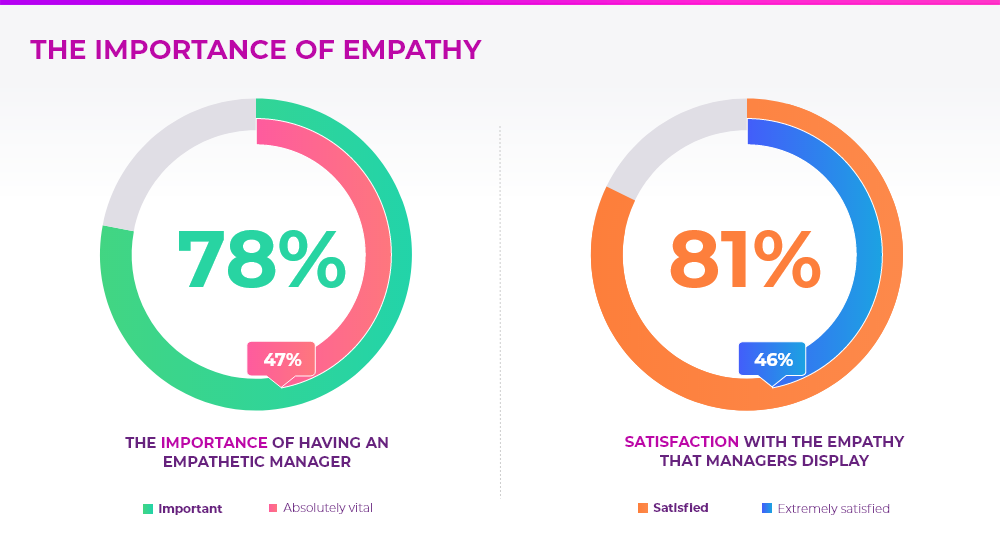
Practicing empathy is more important than ever before partly because people are experiencing the pandemic in very different ways. Being able to genuinely connect with people and understand their needs is a critical component in providing the best support but it undoubtedly takes adaptation and considerable effort. Having visibility into what their teams are working on without micromanaging has been a difficult task for managers during the pandemic. Almost half (45%) of managers said it was extremely challenging, while 87% said it was at least somewhat challenging.

The visibility challenge doesn’t stop at the end of the workday: 81% of managers also said that it was difficult for them to know what is happening in their direct reports’ lives outside of work.

This may be a glimpse into the progressive blending of “work and life.” Moreover, even though employees are looking for more support from their managers, they are not fully ready to open up and share the challenges they are facing outside of work. But even though managers might not not have a clear idea as to what is going on in their employees’ personal lives, the survey results indicate that employees are happy with the flexibility their bosses are providing, with the majority of employees (79%) saying it’s important to have autonomy to adjust their work style and schedule and the exact same percentage (79%) saying that they are satisfied with the amount of autonomy their leaders are giving them.
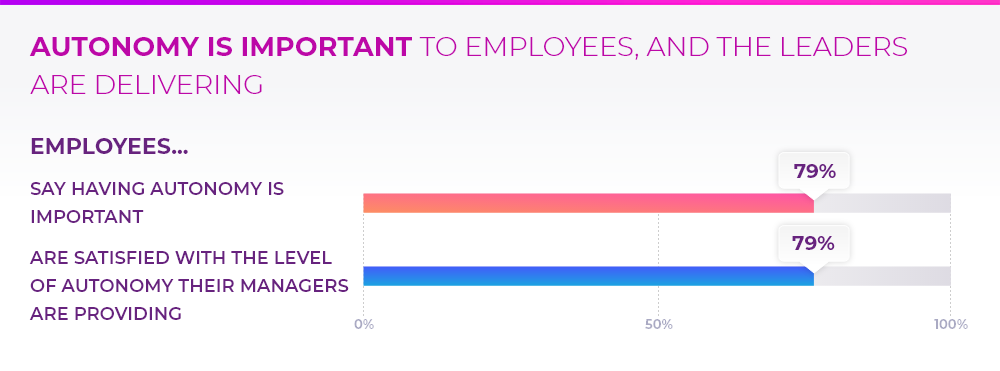
It is encouraging to see this level of trust and emotional connectedness between leaders and their teams. It’s certainly valuable as we continue to evolve in terms of the way we work and look for ways to build a new and better normal.
How technology can help keep employees connected and feel more fulfilled
The good news is that after several months of pandemic, employees and managers have been able to connect effectively and focus on some key needs to make the necessary transition to working from home. Looking ahead, as the world and consequently, the needs of the workers, continue to evolve, being productive (83%), making an impact (79%), and receiving recognition (71%) are the key areas to keep in mind given that employees told us they have a direct impact on how fulfilled they are at work.
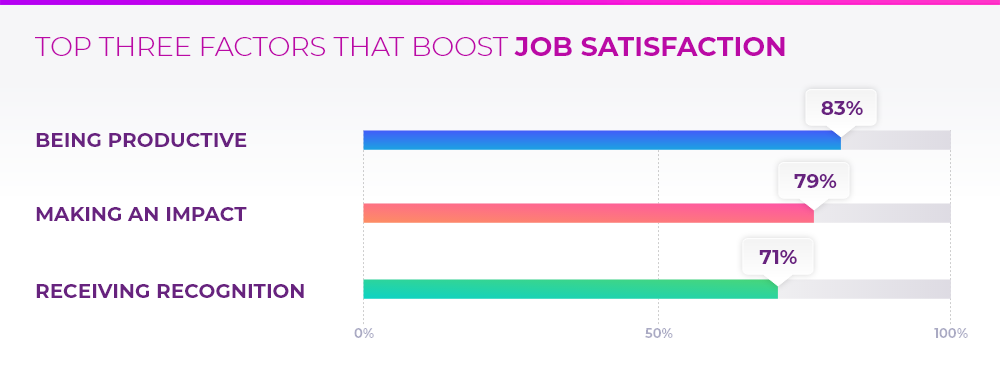
While numerous employers have implemented video conferencing and other communications technologies during the initial phases of the shift to working from home, in the upcoming months there is a huge opportunity to evaluate what other worker and manager needs technology can better fulfill.
Today, managers still report that they don’t have as much visibility into their team’s work as they’d like to have. Remember, (45%) of managers said it was extremely challenging, while 87% said it was at least somewhat challenging to have visibility into what their team is working on without micromanaging.
Through leveraging performance management technologies like BetterMe, managers can set objectives and key results (OKRs) for their team members, giving each person clarity about their individual goals while setting a plan for how they will impact the organization as a whole. The employee’s progress toward these goals can be tracked and updated in real time, making it a natural part of the working dynamic and giving managers ongoing visibility into their teams’ work without feeling like they’re micromanaging.
Additionally, there has never been a better time to make it a priority to help make people visible and elevate them for their work, when they often feel invisible working from home. Digitizing this behavior is not only an incredible way to show appreciation to employees who continue to give their best every day, but it’s also a powerful way to give everyone in the organization a glimpse of the different connections people are making as well as different initiatives being developed. While digitizing performance management can keep goals and progress clear, a digitizing recognition can provide a whole additional level of visibility while bringing company culture to the people no matter where they are located.
A culture and recognition platform like StarMeUp can help strengthen bonds and recommend new connections for employees. Overall, while the pandemic has brought some colleagues closer together, employees may need support to meet new colleagues and grow their networks. Close to half of workers (46%) said they’ve deepened their relationships with colleagues they already felt close to. However, getting to know new colleagues seems to be a challenge, especially for those who worked in an office full time before the pandemic: 42% of all respondents and 48% of former full-time office workers indicated that they have not gotten to know more colleagues since the pandemic.
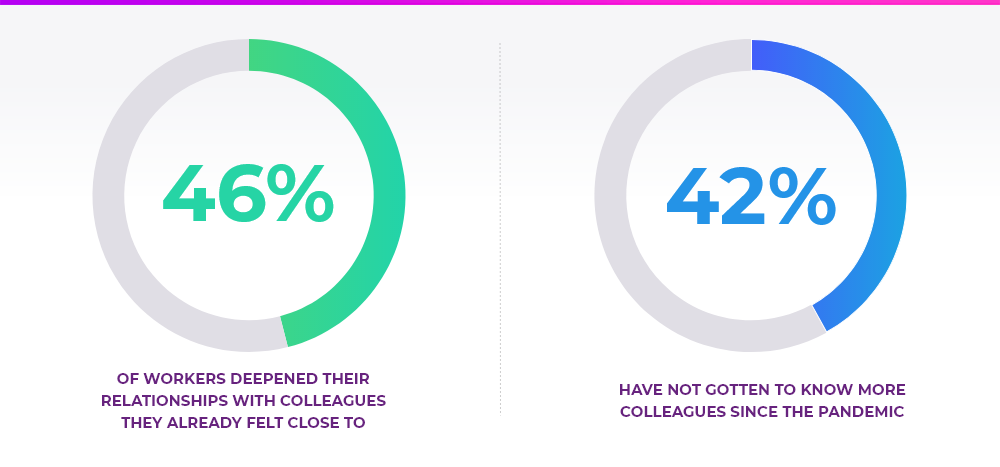
The fast transition from offices to the remote work environment has sometimes been called “lift and shift.” Many organizations focused on safely moving their employees and making sure that basic communication and productivity platforms were in place. In our survey, the majority of employees reported having access to these communications technologies, with only 2% of managers and 10% of individual contributors saying they don’t have access to instant messaging and 1% of managers and 12% of individual contributors saying they don’t have access to videoconferencing for meetings.
The surprising gap came in the difference in access to technology beyond what may be seen as communication necessities, like recognition and performance feedback platforms. In particular, individual contributors were much more likely to lack access to or awareness of these platforms.
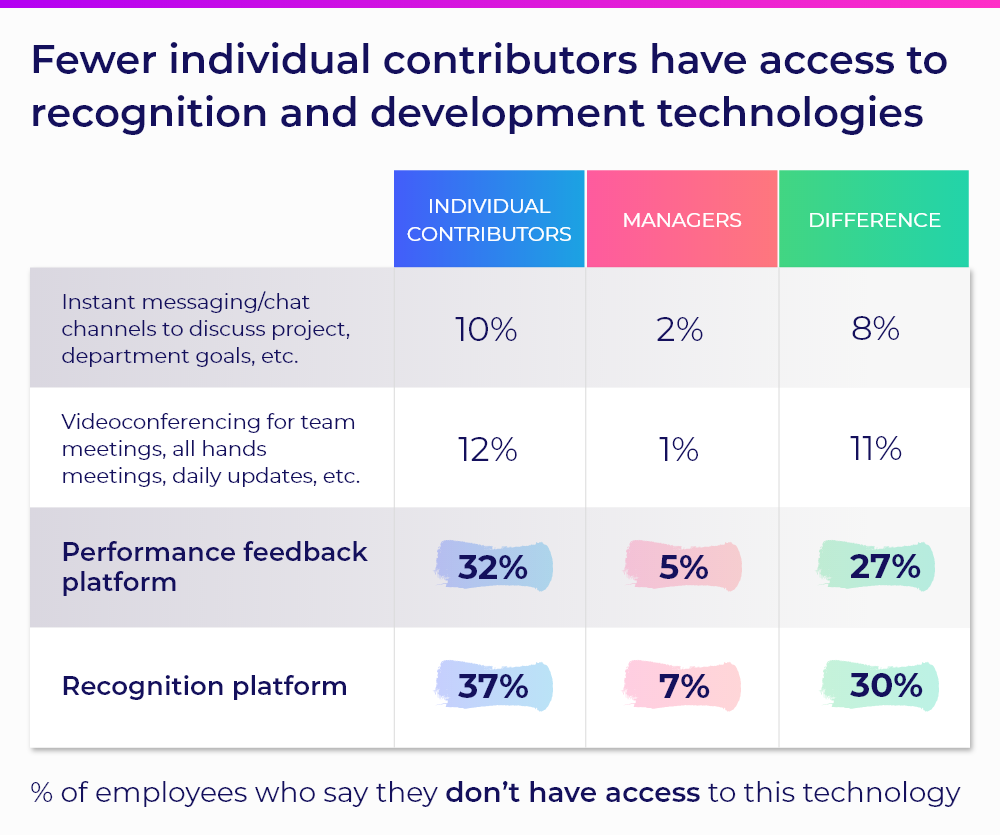
An opportunity to drive the evolution of the world of work
We are more than half a year into the pandemic, and it’s inspiring to see the empathy and autonomy that leaders have been able to establish with their teams. As we continue to drive the evolution of the world of work over the coming months, there is a huge opportunity to leverage technology more effectively to help employees continue to grow relationships inside their organization, gain clarity on how they can make an impact, and continue to feel visible and recognized for their achievements. Organizations have taken vital first steps in equipping their teams with the necessary digital platforms, but there is more to be done to create a strong digital culture to help workers feel productive and valued, no matter where they are physically located, and build a stronger and more sustainable organization of the future.